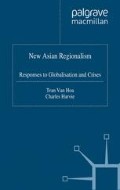Abstract
From the early 1990s there was a growth in the number of RTAs notified to the WTO. This is sometimes known as ‘New Regionalism’. In an exercise that mapped the location and growth of these RTAs, WTO (2000) enumerated some 172 regional trade agreements known to the WTO and in force on 31 July 2000. In an update of these estimates, the WTO has calculated that the number of RTAs (free trade areas and customs unions) in force on March 2002 has surged to 197 (WTO, 2002). In this chapter this growth is referred to as recent regionalism to distinguish it from the earlier wave.
Access this chapter
Tax calculation will be finalised at checkout
Purchases are for personal use only
Preview
Unable to display preview. Download preview PDF.
References
Asian Development Bank (ADB) (2002), ‘Preferential Trade Agreements in Asia and the Pacific’, Asian Development Outlook, Part III, ADB, Manila.
Bagwell, K. and R. W. Staiger (1998), ‘Will Preferential Agreements Undermine the Multilateral Trading System?’, The Economic Journal, 108, July, pp. 1162–82.
Bhagwati, J. N. (1995), ‘US Trade Policy: The Infatuation with Free Trade Areas’ in J. Bhagwati and A. O. Krueger (eds), The Dangerous Drift to Preferential Trade Agreements, American Enterprise institute for Public Policy Research, Washington, DC.
Charnowitz, S. (2002), Trade Law and Global Governance, Cameron and May, London.
Devlin, R. and A. Estevadeordal (2001), ‘What’s New in the New Regionalism in the Americas?’, in V. Bulmer-Thomas (ed.), Regional Integration in Latin America and the Caribbean: The Political Economy o f Open Regionalism, ILAS, London.
Estevadeordal, A. (2002), ‘Traditional Market Access Issues in RTAs: An Unfinished Agenda in the Americas?’, paper presented to the WTO Seminar on Regionalism and the WTO, Geneva, 26 April 2002 (available at the WTO website http://www.wto.org).
Lawrence, R. Z. (1996), Regionalism, Multilateralism and Deeper Integration, Brookings Institution, Washington, DC.
Lloyd, P. J. and K. Vautier (2001), ‘Regional Approaches to Cross-border Competition Policies’, in S. Lahiri (ed.), Regionalism and Globalization, Routledge, London.
McQueen, M. (2002), ‘The EU’s Free-Trade Agreements with Developing Countries: A Case of Wishful thinking?’, The World Economy, vol. 25, pp. 1369–85.
Organisation for Economic Cooperation and Development (OECD) (1995), Regional Integration and the Multilateral Trading System: Synergy and Divergence, OECD, Paris.
Panagariya, A. (1999), ‘The Regionalism Debate: An Overview’, The World Economy, 22, pp. 477–511.
Salazar-Xirinachs, J. M. (2002), ‘Proliferation of Sub-regional Trade Agreements in the Americas: An assessment of Key Analytical and Policy Issues’, Journal of Asian Economics, 13 (No. 2), pp. 181–212.
Scollay, R. and J. P. Gilbert (2001), New Regional Trading Arrangements in the Asia Pacific?, Institute for International Economics, Washington, DC.
Snape, R. H. (1996), ‘Trade Discrimination - Yesterday’s Problem’, Economic Record, 72, December, pp. 381–96.
Thanadsillapakul, L. (2001), ‘Open Regionalism and Deeper Integration: The Implementation of ASEAN Investment Area and ASEAN Free Trade Area’, discussion paper, Department of Economics, University of Melbourne.
Wonnacott, R. J. (1996), ‘Trade and Investment in a Hub-and-spoke System versus a Free Trade Area’, The World Economy, 19 (3), pp. 237–52.
World Trade Organisation (WTO) (1995), Regional Trading Arrangements and the World Trading System, WTO, Geneva.
World Trade Organisation (WTO) (1998), ‘Mapping of Regional Trade Agreements’. (available at the WTO website http://www.wto.org).
World Trade Organisation (WTO) (2000), ‘Mapping of Regional Trade Agreements’, WT/REG/W/41 (available at the WTO website http://www.wto.org).
World Trade Organisation (WTO) (2001), International Trade Statistics2001, WTO, Geneva.
World Trade Organisation (WTO) (2002), ‘Regional Trade Integration under Transformation’, paper presented to the WTO Seminar on Regionalism and the WTO, Geneva, 26 April 2002 (available at the WTO website http://www.wto.org).
Editor information
Editors and Affiliations
Copyright information
© 2003 Palgrave Macmillan, a division of Macmillan Publishers Limited
About this chapter
Cite this chapter
Lloyd, P.J. (2003). The Systemic Effects of Recent Regionalism. In: Van Hoa, T., Harvie, C. (eds) New Asian Regionalism. Palgrave Macmillan, London. https://doi.org/10.1057/9780230377561_3
Download citation
DOI: https://doi.org/10.1057/9780230377561_3
Publisher Name: Palgrave Macmillan, London
Print ISBN: 978-1-349-51382-6
Online ISBN: 978-0-230-37756-1
eBook Packages: Palgrave Economics & Finance CollectionEconomics and Finance (R0)

